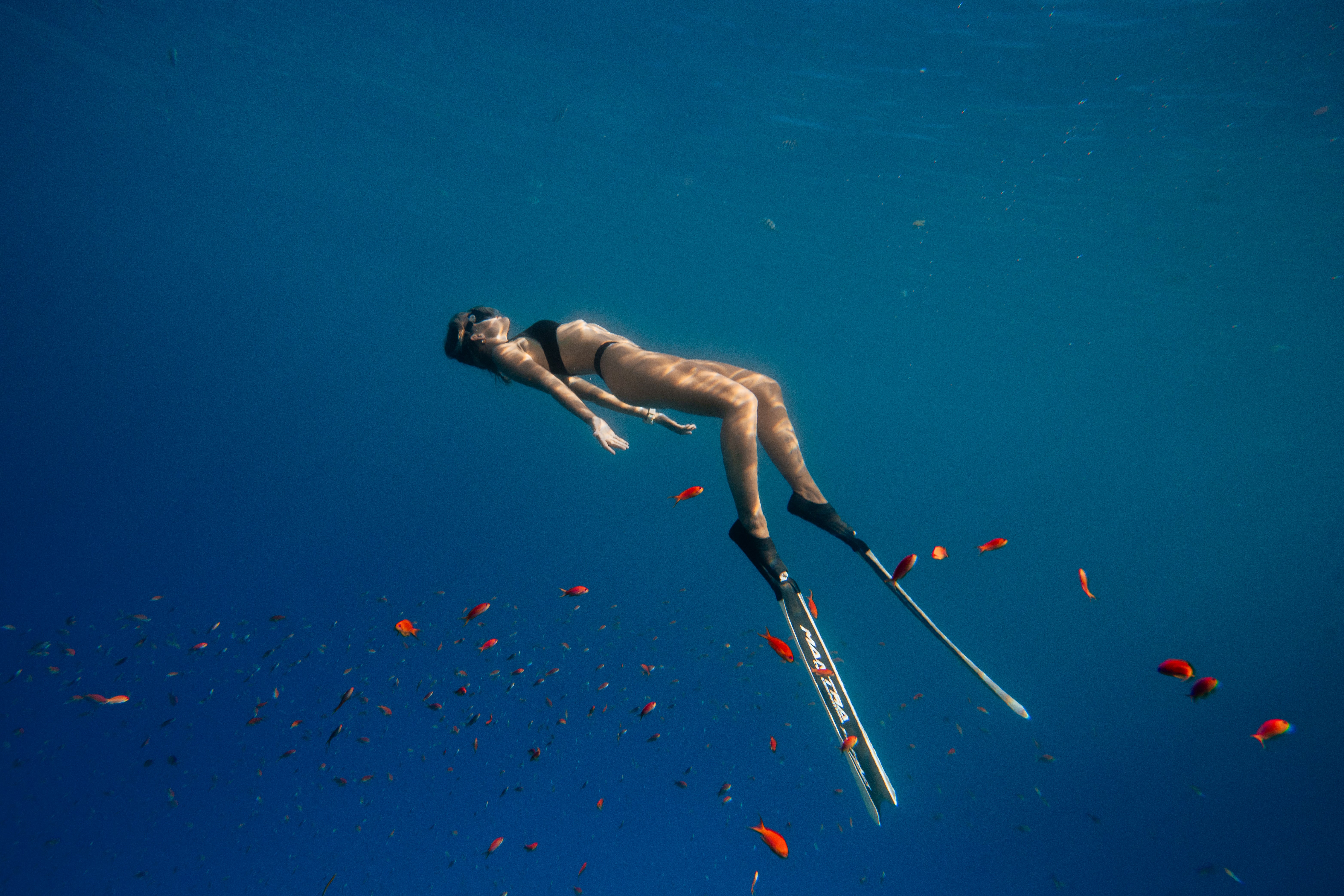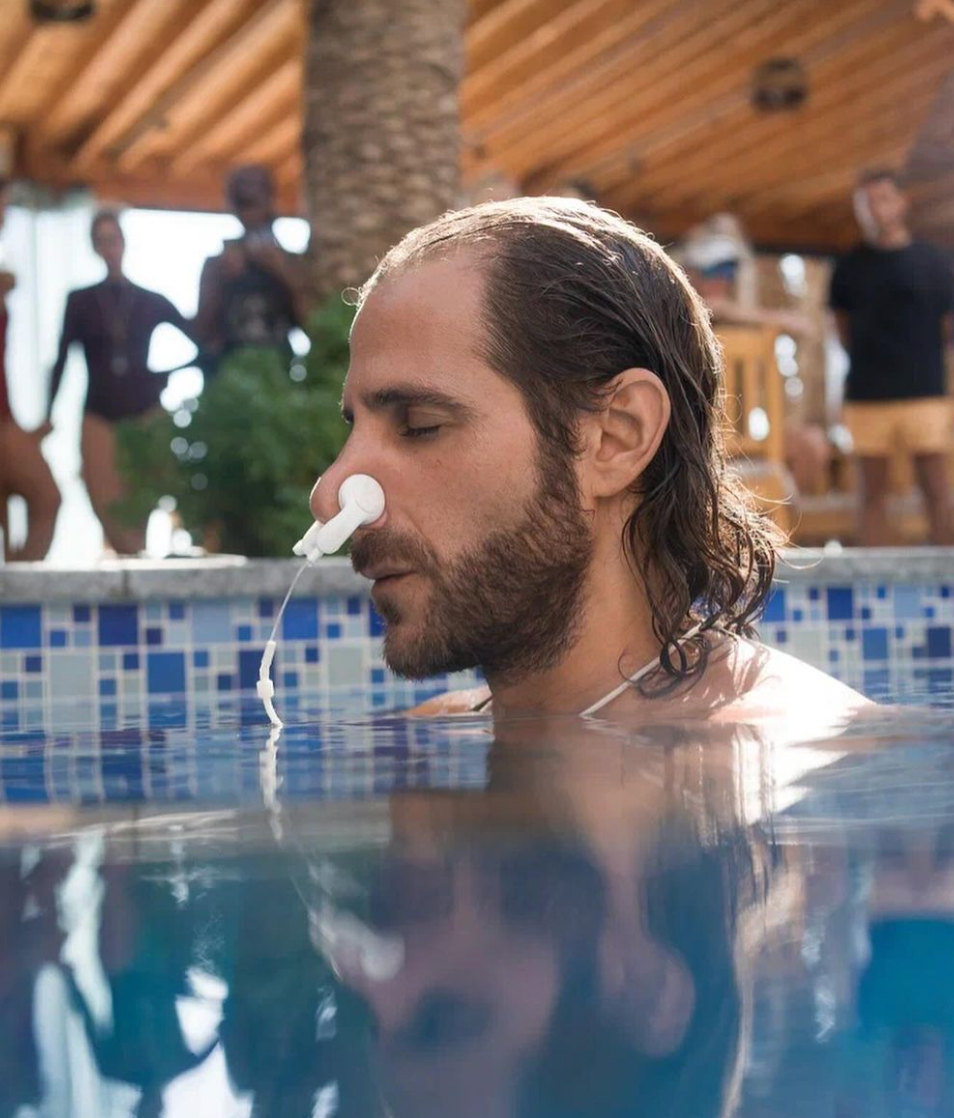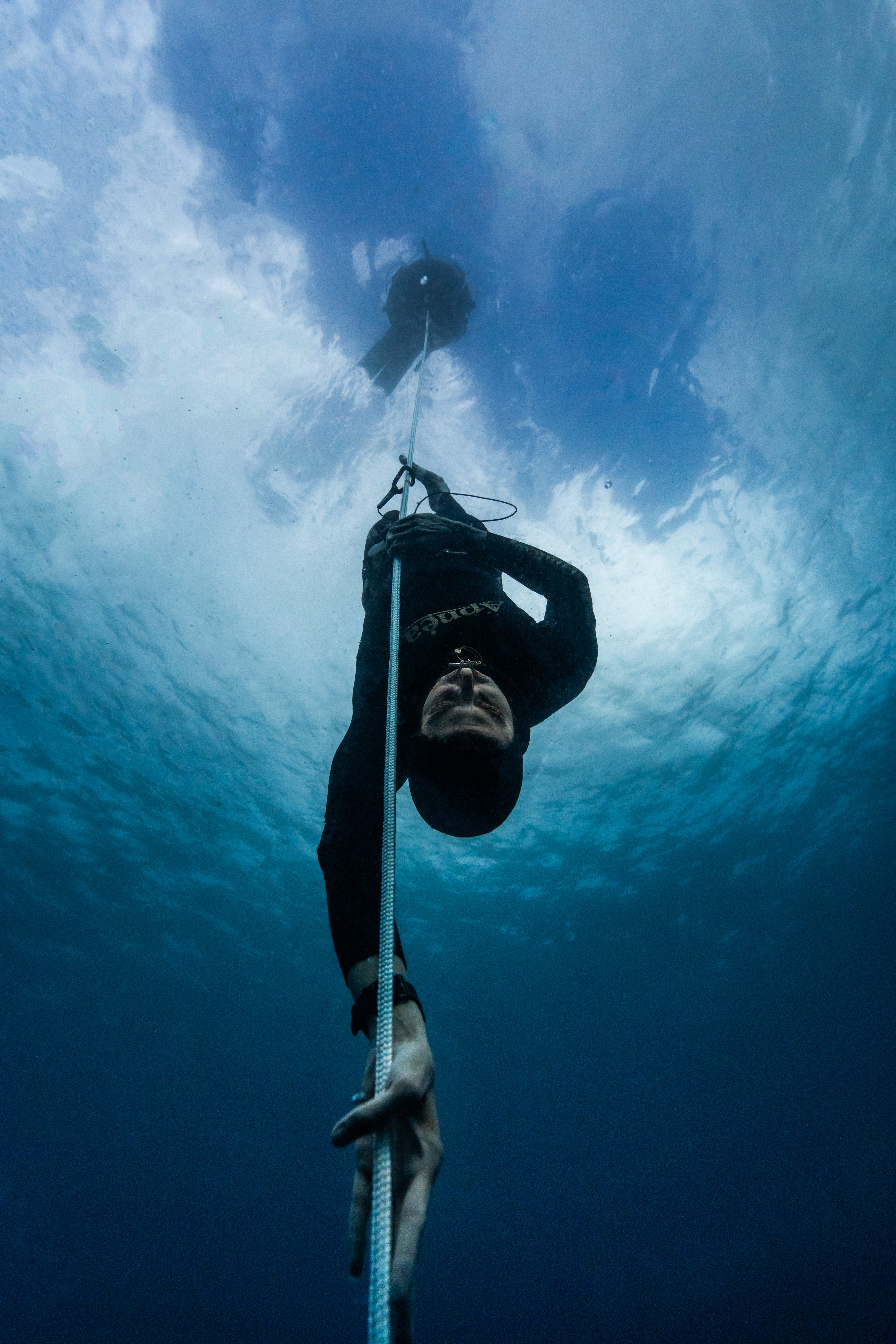Forget cold water swimming – freediving is what people are doing now for their mental health
The incredible sealife and invigorating challenges on offer through freediving are almost a given, but many who take up the sport are finding a unique healing process when holding their breath and going deeper – Tamara Davison speaks to those taking risks to explore the serenity of the water

Aaron Fisher’s mental health, like that of many people around the world, suffered during the Covid-19 pandemic. “I started going through really bad depression at that time,” the Canadian says before a trip to Mexico changed everything.
In the Yucatan Peninsula, Fisher discovered freediving – a sport where people dive underwater while holding their breath. After completing his first course, Fisher was hooked. “I would just dive every single day and hold my breath every single day in the cenote – and I just loved it,” he explains.
“What I loved about it was taking that breath, and once you’re in the water, it’s quiet,” he adds. “That peace, that absolute quietness around you. Hearing things you haven’t heard inside yourself, connecting to parts of yourself, that awareness within.”
Fast forward to the present day, and freediving has become part of Fisher’s identity. He now focuses on static freediving (holding his breath in a body of water) and has set his sights on breaking national records. Fisher also firmly advocates for the power of freediving and its potential connections to improved mental wellness.

This narrative is not unique within the freediving community. Many athletes and recreational divers say they’ve undergone transformative journeys while discovering the sport. Most believe there’s a unique combination of attributes tied to freediving that can unlock deeply therapeutic benefits.
Freediving’s emergence into the mainstream
Unlike scuba divers, who rely on breathing apparatus and oxygen tanks, freedivers take one deep breath at the surface before descending into the water. While the practice is traced to ancient communities like the Bajau tribe, which would dive for food, it’s only emerged as a sport and recreational hobby within the last few decades.
In popular culture, like social media, freediving is often depicted through stunning images of divers exploring reefs, marine life and open water. Aided with long, slender fins and free of cumbersome equipment, recreational freediving is precisely what its name suggests: freeing.
However, it also comes with risks. Seen by some as an “extreme sport”, proper training and safety measures are essential to avoid blackouts and pressure-related injuries. The extreme nature of freediving is particularly highlighted by films like the 2023 Netflix documentary The Deepest Breath, which introduced viewers to the thrilling and sometimes dangerous world of competitive freediving.
Yet interest in the sport continues to soar. The freediving body AIDA International certified 2,809 students in 2014 for passing their AIDA 2 course, often considered the first step in training. That number has soared to 42,532 students certified for the same course in 2024, so far.
Earlier this year, Arnaud Jerald also became the first freediver to carry the Olympic torch, signalling further mainstream recognition of the sport. Despite growing interest, studies into the sport have been slow to catch up.
There’s plenty of research on the links between sports and mental wellness, as well as the benefits of breathing techniques or wider exposure to nature. However, research into the psychological benefits of these combined elements through freediving is limited. One 2013 investigation, however, concluded that freedivers displayed lower stress and anxiety levels and had better coping mechanisms than non-freedivers.
Therapeutic benefits
Anecdotal evidence and lived experiences from freedivers suggest there is indeed a connection to mental wellbeing. Freedivers often credit this to breathing and relaxation, as well as the community, the connection to nature, and the mindful lifestyle freediving promotes. Building blocks often tied to good mental health such as meditation, movement and emotional honesty are key disciplines in freediving.
“When it comes to freediving, breath is a technology,” Fisher explains, highlighting the importance of the period just before a dive. Known as a “breathe up”, freedivers spend several minutes floating on the surface and breathing before taking their final breath. While there are many personal strategies and techniques, the goal is to trigger the parasympathetic nervous system (the opposite of fight-or-flight), helping to slow the heart rate and induce more relaxation.
That peace, that absolute quietness around you. Hearing things you haven’t heard inside yourself, connecting to parts of yourself, that awareness within
This preparation period is a unique characteristic that sets freediving apart from other sports. Freedivers are essentially doing “nothing”, trying to focus their minds and release muscle tension. Creating this stillness can be mentally challenging, so applying certain techniques like a “body scan” helps bring focus to the present moment – and can be therapeutic.
Diving in water also has a part to play as well, helping freedivers achieve meditative states through weightlessness. “We take away the sensation of gravity, so everything becomes uniform around us,” William Trubridge, one of the world’s deepest freedivers, tells The Independent. By removing most external stimuli, Trubridge believes divers can tap into a state where they simply observe their body’s sensations in the present moment.
“There’s no up, down, to the side because there’s no gravity. You don’t feel any pressure on your body in any particular place. So everything’s uniform, which means you kind of lose the sensation of having a body.”
A healing process
Stories of healing through freediving are also becoming more common, however, Vera Giampietro’s experience is quite unique. Doctors told the Swiss freediving record holder she might never dive again after an incident of medical malpractice in 2018 left her with just 25 per cent of her eardrum. Traumatised, Giampietro sought the help of various doctors, therapists and friends to process her pain. The incident knocked her confidence and impacted all areas of her life, but she never lost hope.

Despite countless failed surgeries, Giampietro was determined to return to freediving and the life she loved – even with a damaged eardrum. The mental healing process ultimately started when she allowed herself to return to the water.
“Even though I started diving with a handicap in a way, that’s when I also started processing all these emotions,” Giampietro says. Various elements of freediving played a part in her recovery – from being surrounded by a community of supportive divers to learning how to let go ahead of a dive. She adds: “Having to surrender and accept that you cannot control everything… I think it’s the most difficult part of this activity because we are so used to control.”
Giampietro has now returned to freediving and continues to break national records, crediting the water as crucial to her healing process and overcoming the past trauma. “For me, freediving has always been a way to be honest with myself and accept and face difficult emotions that I was probably hiding from myself,” she adds.
“It doesn’t matter if you go to 10 meters or 100, if you hold your breath for two minutes or five; if you manage to find a way to be at peace with yourself and to be present, then that’s all it matters.”
Wider applications
William Trubridge is a renowned freediver with multiple world, continental, and national records and a passionate advocate for the sport’s growth. When Trubridge began competing, he realised that success in competitive freediving demanded complete relaxation – a paradox in a world of competitive sports, which often rely on adrenaline. “In freediving, it’s the opposite,” he explains.
Harnessing his breath, regulating his nervous system, and establishing complete mental focus enabled Trubridge to unlock incredible depths – but also navigate everyday life.
“Freediving was this test tube experiment in high-pressure stress management,” Trubridge says. “Those techniques in that test tube environment of extreme physical and mental pressure have allowed me to break world records.”
“But then I’ve seen what incredible application they have to all the other forms of pressure that we encounter in our lives, whether at work or in personal life, these same techniques have the exact same power.”
Like others, he believes that the skills learned through freediving linked to breathing, mental focus and physical awareness are also transferable to life outside the water. As a result, Trubridge founded the Mental Immune System, a programme helping people overcome and respond to stress and anxiety through the same mental and physical techniques used by freedivers. It encourages things like diaphragmatic breathing, returning to the present moment, and observing our thoughts, helping people transform their mindset.
Echoing Trubridge’s perspective, Aaron also believes we hold simple tools with vast potential at our fingertips. He reflected on how freediving framed his other experiences: “Before I go into a business meeting, I’ll stop, relax, have a breath, be focused, and understand what I’m looking to do.”
While it’s rare in our fast-paced world to find much time for pause, freediving could serve as a reminder that some of the most important tools come from within. “The one thing that will never lie to you in your life is your breath,” Fisher adds. “The only thing is we don’t take the time to understand it.”




Join our commenting forum
Join thought-provoking conversations, follow other Independent readers and see their replies
Comments